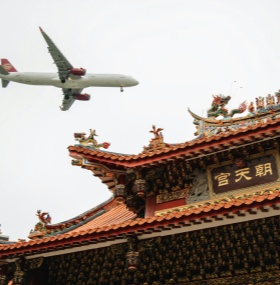Traveling in China can be a fascinating adventure, but navigating the country's vast cities, language barriers, and cultural differences can be challenging for international visitors. Fortunately, with the right mobile apps, you can simplify many aspects of your trip and enjoy a more seamless experience. From getting around to translating menus and booking transportation, these essential apps will help you navigate China with ease, ensuring you make the most of your time in the country.
Kindly feel free to contact us for more help or suggestion about your China tour.
1. Navigation and Maps: Baidu Maps
Unlike many other countries, Google Maps is often unreliable in China due to restrictions. However, Baidu Maps is the go-to navigation app in China. Whether you're traveling by subway, bus, taxi, or walking, Baidu Maps offers detailed directions and public transportation routes, making it easy to explore both major cities and rural areas.
Features: Offers maps, public transportation routes, driving directions, and real-time traffic updates.
Tip: While the app is primarily in Chinese, it has an intuitive interface, and you can search for places using Pinyin (Romanized spelling). Alternatively, you can use translation apps like Google Translate to help with any language barriers.
2. Ride-Hailing: DiDi
For easy and convenient transportation around Chinese cities, DiDi is the most popular ride-hailing app. It’s similar to Uber and can help you book a taxi or private car quickly. DiDi is available in most Chinese cities and provides both Chinese and English-language interfaces, making it more accessible to international travelers.
Features: Taxi, private car, and ride-sharing options. You can check the fare estimate, track your ride, and pay directly via the app.
Tip: DiDi supports payment via WeChat Pay and Alipay, so it’s useful to link your account to one of these apps for easy transactions.
3. Language Translation: Pleco & Google Translate
Understanding and communicating in Chinese can be a challenge, especially if you’re not familiar with the language. Thankfully, Pleco and Google Translate are two powerful tools to help you bridge the language gap during your trip.
Pleco: This is a must-have app for any traveler heading to China. Pleco not only translates text but also provides definitions, pinyin (pronunciation), and example sentences for Chinese words. It also includes an OCR (optical character recognition) feature that allows you to scan and translate printed Chinese text directly.
Google Translate: Google Translate can help you translate entire sentences or single words in both directions. It also includes a camera mode that allows you to scan Chinese text in real time, which is useful when reading menus or signs.
Tip: Download both apps to maximize translation capabilities. Pleco is excellent for learning individual words and characters, while Google Translate is better for sentences or when you’re on the go.
4. Public Transportation: City Metro Apps
Most major cities in China, including Beijing, Shanghai, Guangzhou, and Chengdu, have their own metro apps that help you navigate the subway system. These apps provide routes, schedules, and fare information, making it easy to get from one place to another.
Features: Subway and bus routes, real-time updates, and station maps.
Tip: If you're traveling by subway in cities like Beijing or Shanghai, these apps will save you time and help you avoid getting lost. The metro stations usually have English signs, but the apps will help you plan your journey better.
5. Food Delivery: Meituan & Ele.me
One of the joys of traveling in China is the opportunity to taste delicious local food. However, if you prefer staying in or need food delivered to your accommodation, Meituan and Ele.me are two of China’s leading food delivery apps.
Meituan: This all-in-one app not only provides food delivery services but also offers information on local restaurants, ticket booking, hotel reservations, and even travel packages. It’s a great option for discovering new places to eat and getting food delivered directly to your hotel.
Ele.me: Focused on food delivery, Ele.me provides access to a wide range of restaurants and local dishes. You can also browse through different food categories, including Chinese street food, snacks, and international cuisine.
Tip: While Meituan and Ele.me have Chinese-language interfaces, you can use pictures to help identify food items or use translation tools like Pleco to assist with the menus.
6. Payments: WeChat Pay & Alipay
In China, mobile payments have become the norm, and cash is rarely used for daily transactions. WeChat Pay and Alipay are two major apps used for making payments across the country.
WeChat Pay: Integrated into the popular messaging app WeChat, this service allows you to pay for anything from street food to luxury shopping. You can transfer money, pay bills, and even book tickets for attractions using WeChat Pay.
Alipay: Alipay, a widely used mobile wallet, supports payments at restaurants, hotels, and even street vendors. Alipay also offers an excellent range of services, including travel bookings and insurance.
Tip: To use these apps, you’ll need a Chinese bank account or a foreign card linked to the app. Make sure to set up your account before arriving to ensure you can use mobile payments without issues.
7. Train Booking: 12306
China’s high-speed train network is one of the most efficient in the world, and 12306, the official train booking app, allows you to easily book tickets for trains across the country. You can check train schedules, seat availability, and purchase tickets directly through the app.
Features: Train schedules, real-time availability, ticket booking, seat selection.
Tip: While the 12306 app is primarily in Chinese, you can use translation apps or third-party services like Trip.com (which offers English-language support) to help with booking.
8. Currency Exchange: XE Currency
If you need to convert your home currency to Chinese Yuan (RMB), the XE Currency app is a useful tool. This app provides live exchange rates and allows you to track changes in the currency market.
Features: Currency conversion, live exchange rate tracking.
Tip: XE Currency works offline as well, so you can use it to check exchange rates even if you don’t have internet access.
9. Booking Attractions: Trip.com
If you're looking to book flights, hotels, or tours during your trip to China, Trip.com (previously known as Ctrip) is one of the most popular travel booking apps in China. It offers a wide range of options, including discounted hotels, flight tickets, and local tours.
Features: Booking for hotels, flights, trains, and activities. English-language interface.
Tip: Book your tickets in advance, especially during peak tourist seasons like Golden Week or Chinese New Year, to avoid high prices or long lines.
10. Social Networking: WeChat
Finally, WeChat is essential for staying connected with friends, family, and locals during your trip. Apart from messaging, it offers a range of functions, including mobile payments, news updates, and social networking through its “Moments” feature.
Features: Messaging, video calls, payments, social sharing, news, and more.
Tip: Many local businesses and tour guides use WeChat for communication, so it’s a great tool to have while navigating your trip.
Related Posts
Create Your Customized Trip
Take about 2 minutes to fill the form to tell us how you like to travel, and get a reply within 1 working day.








